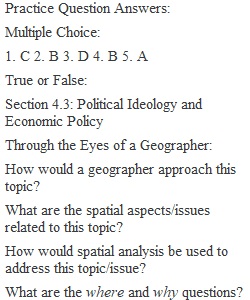


Q Section 4.3: Political Ideology and Economic Policy Through the Eyes of a Geographer: How would a geographer approach this topic? What are the spatial aspects/issues related to this topic? How would spatial analysis be used to address this topic/issue? What are the where and why questions? How can this topic be studied and analyzed using the five themes of geography? Overview: A prominent subfield of human geography is political geography. Geographers are interested in the spatial variation of political systems. Spatial patterns of political systems are produced by peoples and societies with different values and beliefs. These values and beliefs manifest themselves in political ideologies. Groups with similar political ideologies form political parties that promote certain perspectives, laws, and policies. A strong link exists between political ideology and economic policy. Economic policies typically decide the allocation of goods and services, or -- simply stated -- who gets what. Critical Thinking/Discussion Questions: 1. What is political ideology? What determines political ideology? Is one political ideology better than another? What role do values and beliefs play in creating political ideology? 2. How is political ideology linked to economic policy? Discuss how different political ideologies produce different economic policies. What makes Democrats and Republicans different? 3. Discuss the global spatial variation of political ideology. Is the distribution reflected in economic policies? Do certain countries try to promote their political ideologies and economic policies in other countries? Practice Questions (Write Correct Answer in Blank): Multiple Choice: 1. ___ Political ideologies essentially offer differing viewpoints concerning the MAIN issue of: A) elected officials B) moral issues C) resource allocation D) international trade 2. ___ This term can best be defined as “relationships between people” and implies control: A) economics B) politics C) culture D) sustainability 3. ___ A person’s willingness to break a law depends most strongly on their beliefs and the ____: A) opportunity B) desire C) conditions D) consequences 4. ___ The ideology of most Western societies today support this type of decision making: A) global B) individual C) group D) governmental 5. ___ The “tendency to judge other cultures by the standards and practices of one’s own” and to consider one’s own culture as the norm is called: A) ethnocentrism B) racism C) superiority D) acculturaltion True or False: 1. ___ The radical political ideology would be most likely to support “life boat ethics.” 2. ___ Most Americans do not have a good understanding of the foundations of political ideology. 3. ___ Political ideology is most strongly shaped by values and beliefs. 4. ___ The conservative political ideology views the individual as the unit of analysis. 5. ___ Typically in the U.S., the majority of members of the Republican Party would consider themselves Conservatives.
View Related Questions